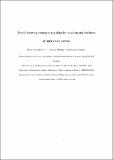Files in this item
Social learning strategies regulate the wisdom and madness of interactive crowds
Item metadata
| dc.contributor.author | Toyokawa, Wataru | |
| dc.contributor.author | Whalen, Andrew | |
| dc.contributor.author | Laland, Kevin N. | |
| dc.date.accessioned | 2019-07-20T23:43:40Z | |
| dc.date.available | 2019-07-20T23:43:40Z | |
| dc.date.issued | 2019-02-01 | |
| dc.identifier | 257464042 | |
| dc.identifier | 36af7a3d-68a3-4caf-90f0-822983292b1e | |
| dc.identifier | 85060500845 | |
| dc.identifier | 000458449900016 | |
| dc.identifier.citation | Toyokawa , W , Whalen , A & Laland , K N 2019 , ' Social learning strategies regulate the wisdom and madness of interactive crowds ' , Nature Human Behaviour , vol. 3 , no. 2 , pp. 183-193 . https://doi.org/10.1038/s41562-018-0518-x | en |
| dc.identifier.issn | 2397-3374 | |
| dc.identifier.other | RIS: urn:C545DD965B7000A9745F6350EF55364A | |
| dc.identifier.other | RIS: Toyokawa2019 | |
| dc.identifier.other | ORCID: /0000-0002-2457-0900/work/60630396 | |
| dc.identifier.uri | https://hdl.handle.net/10023/18143 | |
| dc.description | This experiment was supported by The John Templeton Foundation (40128 to K.N.L.) and Suntory Foundation research support (2015-311 to W.T.). The computer simulations and computational model analyses were supported by JSPS overseas research fellowships (H27-11 to W.T.). The phenomenological model analyses were supported by JSPS KAKENHI (grant number 17J01559). | en |
| dc.description.abstract | Why groups of individuals sometimes exhibit collective ‘wisdom’ and other times maladaptive ‘herding’ is an enduring conundrum. Here we show that this apparent conflict is regulated by the social learning strategies deployed. We examined the patterns of human social learning through an interactive online experiment with 699 participants, varying both task uncertainty and group size, then used hierarchical Bayesian model fitting to identify the individual learning strategies exhibited by participants. Challenging tasks elicit greater conformity among individuals, with rates of copying increasing with group size, leading to high probabilities of herding among large groups confronted with uncertainty. Conversely, the reduced social learning of small groups, and the greater probability that social information would be accurate for less-challenging tasks, generated ‘wisdom of the crowd’ effects in other circumstances. Our model-based approach provides evidence that the likelihood of collective intelligence versus herding can be predicted, resolving a long-standing puzzle in the literature. | |
| dc.format.extent | 1304481 | |
| dc.language.iso | eng | |
| dc.relation.ispartof | Nature Human Behaviour | en |
| dc.subject | QH301 Biology | en |
| dc.subject | DAS | en |
| dc.subject | BDC | en |
| dc.subject | R2C | en |
| dc.subject.lcc | QH301 | en |
| dc.title | Social learning strategies regulate the wisdom and madness of interactive crowds | en |
| dc.type | Journal article | en |
| dc.contributor.sponsor | John Templeton Foundation | en |
| dc.contributor.institution | University of St Andrews. School of Biology | en |
| dc.contributor.institution | University of St Andrews. Centre for Biological Diversity | en |
| dc.contributor.institution | University of St Andrews. Scottish Oceans Institute | en |
| dc.contributor.institution | University of St Andrews. Institute of Behavioural and Neural Sciences | en |
| dc.contributor.institution | University of St Andrews. Centre for Social Learning & Cognitive Evolution | en |
| dc.identifier.doi | https://doi.org/10.1038/s41562-018-0518-x | |
| dc.description.status | Peer reviewed | en |
| dc.date.embargoedUntil | 2019-07-21 | |
| dc.identifier.grantnumber | 40128 | en |
This item appears in the following Collection(s)
Items in the St Andrews Research Repository are protected by copyright, with all rights reserved, unless otherwise indicated.

